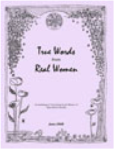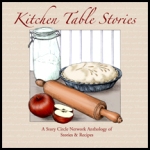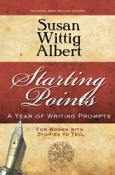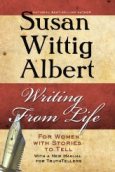As a writer, I often use my journal to play around with strategies I pick up from other writers’ work or with strategies I invent to get myself writing. Playing around with the strategies, in combination with observing the “show don’t tell rule” (use imagery and detail that appeal to the senses rather than general summarizing words), I find my journal writing becomes valuable writing practice.
One of my favorite exercises is to play with sound in my writing. We are a very visual culture and it is easy to neglect sound imagery in writing since visual imagery comes more naturally to most of us. To force myself to get sound into my writing, I think of a noisy place–like the street I used to live on in Los Angeles on garbage collection day–and then set about describing it in a journal entry with words that describe the sounds. Here’s an example:
On garbage collection days, the disposal company my husband calls Loud and Early slams and smashes its way into our sleep. We hear the sounds of garbage cans colliding with the thick rusty truck, then scraping and clattering across the asphalt and cement of street and curb. When we hear the garbage truck grind the dregs of our existence to a pulp, we slide our feet to the floor. A police helicopter hurls its hello from overhead, shaking the walls and shattering any memory of our dreams.
When my writing includes sounds from my environment, I find myself more immersed in the experience I am writing about and continue writing longer than I might have without the sound imagery.
Smell is another underused sense in written work. I am fond of playing with similes to help evoke smells. What I evoke leads to memories I will put on the page with vivid detail. To start evoking smells, I think of something I smell in my daily life and compare it to something else I remember smelling:
The smell of clothes fresh from the dyer is like the smell of bread baking at my friend’s house.
The smell of the charcoal grill after the fire has died down is like my girlfriend’s clothes after the fire in her apartment.
Smell of jasmine flowers as I walk by is the smell of my grandmother’s dress as I clung to the folds.
What I like about writing these similes is that I never know what leap of association I’ll make and what story I might launch myself into. The memory of my grade school friend’s apartment building burning down is vivid to me as it comes back through my sense of smell, and I can continue a piece of writing about that with memories of standing outside watching red flames coming out of all the windows and standing with my friend and her mother feeling the heat that the flames produced as we watched fire fighters dragging heavy hoses and climbing onto the roof.
Just as forcing ourselves to write from our senses of hearing and smell can produce topics and skillfully drawn description, relying on certain sentence structures can help us be clever and entertaining. I am fond of copying fiction writer Ron Carlson’s sentence structure when I want to add wit to my writing. He shared his style of journaling years ago as a contributor to my book The Writer’s Journal: 40 Contemporary Writers and Their Journals, and I’ve been playing with his ideas ever since. He writes clever sentences and keeps them around for “thickening the brew” when he fleshes out stories. Here’s one of his sentences: “They discovered that the elevator in their dilapidated building acted as a bellows for the air conditioning, so they sent the child out an hour every afternoon to ride up and down.”
When I used Ron Carlson’s sentence as a pattern, I wrote this:
Because I discovered that my cats’ scratching altered the upholstery on my couches, I let them do a patch every day and then I came with darning needles and embroidery paraphernalia and wove a beautiful array of colors into the tatters. Now people all over the world order my cat-scratched upholstery.
I have invented the beginning of a story about the way the business changed the “I’s” life. I know I could also keep on using the sentence to write about more discoveries until I evoked an interesting character who just loves to put the world together in her own way.
The beauty of playing with these exercise ideas is that you can use them over and over when you don’t know quite what to say but know you’d like to be saying it more skillfully and surprisingly! Using the strategies again and again, you’ll find that you begin to automatically incorporate more playful attitudes into your writing and interest yourself more in putting your words on the page. And you’ll find you have spawned many opportunities for more writing.







I like this idea of experimenting with sound and smell in journal entries. They are both definitely my weak links and I could benefit from this.
Val, I am glad you like the idea. Send in some samples of what you do if you’d like.
good advice, thank you! I have kept a journal for years
Sheila,
Good examples of HOW to bring in the sound and smell. I like the idea of using the journal as an exercise book or a sketch book–not only a place to record our personal thoughts-feelings-perceptions-activities.
This approach broadens the definition of journal/diary. As an artist I used exercise/sketch books to work out ideas in a body of work. It was a way to focus in on the flood of ideas and sensations that fed me as I formed my work.
Janet Riehl
I have made a hard copy of this to put in my journal that I have kept for years. Some nights I am so tired I just put in the facts. This will help me enhance that a bit.
Sheila,
I just love not only the points you make about using more sensory detail in your written descriptions, but the examples you provide really make your point come alive. I also like the way you took the structure of another writer’s work and practiced applying it with your own writing. Journal writing is the perfect venue to perfect the writing craft, and I love how you expressed it and gave example.
I have chosen your post, Keeping a Journal Can Facilitate Good Writing, for the #JournalChat Pick of the Day on 5/14/13 for all things journaling on Twitter; a link will be posted on the social networks, on my blog and website Refresh with Dawn Herring, and in my weekly Refresh Journal:http://tinyurl.com/coo5rbo.
#JournalChat Live is every Thursday, 5 EST/2 PST, for all things journaling on Twitter; our topic this week is Your Journaling: Keep It Brief! Mari McCarthy is our special guest.
I appreciate your take on how journal writing can enhance your writing.
Be refreshed,
Dawn Herring
Your Refreshment Specialist
Host of #JournalChat Live and Links Edition on Twitter
Author of The Birthday Wall: Create a Collage to Celebrate Your Child
Pingback: Keeping a Journal Can Facilitate Good Writing | Write4Life